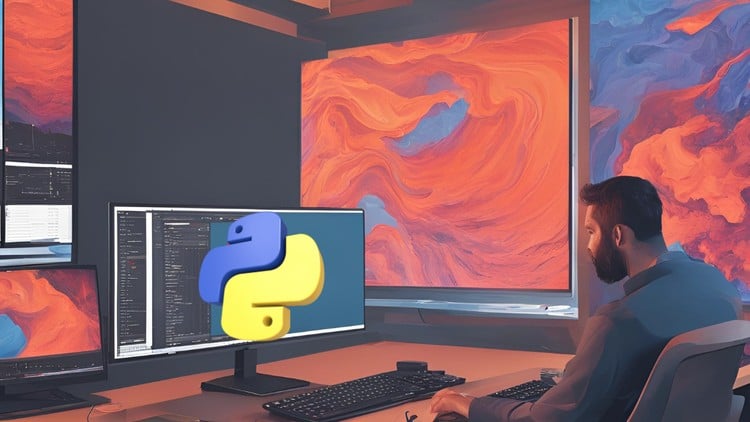
Learn Python Object Oriented Programming from Scratch: Master Classes, Inheritance, Polymorphism, and More
⏱️ Length: 3.6 total hours
⭐ 4.24/5 rating
👥 26,461 students
🔄 May 2025 update
Add-On Information:
Note➛ Make sure your 𝐔𝐝𝐞𝐦𝐲 cart has only this course you're going to enroll it now, Remove all other courses from the 𝐔𝐝𝐞𝐦𝐲 cart before Enrolling!
-
Course Overview
- This concise yet comprehensive course guides you through the fundamental paradigm shift from procedural scripting to object-oriented programming in Python, equipping you with the architectural mindset to build robust and scalable applications.
- Embark on a journey to understand how software components can be structured logically, mirroring real-world entities and their interactions, leading to more intuitive and manageable codebases.
- Discover the strategic advantage of designing systems that are inherently flexible, adaptable, and easily extensible, paving the way for advanced software development practices.
- Explore a practical, hands-on curriculum specifically crafted to demystify advanced programming concepts, enabling you to construct sophisticated, maintainable, and reusable Python code.
- Learn to elevate your Python projects beyond simple scripts, transforming them into professional-grade applications ready for deployment and collaborative development environments.
- Understand the core principles that drive efficiency and stability in large-scale software projects, positioning you as a more valuable and capable Python developer.
- Uncover how the elegant structure of object-oriented code naturally enhances problem-solving capabilities, allowing for clearer logical separation and reduced complexity in intricate systems.
- Gain insights into designing software with longevity in mind, where changes and additions can be made with minimal disruption to existing functionalities.
-
Requirements / Prerequisites
- A foundational understanding of Python’s basic syntax, including variables, data types, conditional statements, looping constructs, and function definitions.
- Familiarity with writing and executing simple Python scripts in any preferred coding environment or Integrated Development Environment (IDE).
- A working computer with a Python installation (version 3.6+ is recommended for optimal compatibility with modern practices).
- No prior experience with object-oriented programming concepts is necessary, as this course is designed to teach you from the ground up.
- An eagerness to transition from basic scripting to more advanced, structured software engineering principles.
- A curious mind and willingness to engage with abstract concepts that form the backbone of modern application development.
-
Skills Covered / Tools Used
- Developing highly organized and self-contained software components that promote reusability and simplify complex system design.
- Crafting sophisticated code structures that minimize redundancy and promote efficient resource utilization across various application modules.
- Implementing advanced mechanisms for defining and managing the behavior of custom data types, enhancing their interaction with standard Python operations.
- Architecting flexible interfaces that allow different parts of an application to communicate seamlessly, adapting to evolving requirements without breaking existing functionality.
- Mastering techniques to establish clear hierarchical relationships between code entities, facilitating easier maintenance and logical grouping of related functionalities.
- Applying principled design decisions to safeguard data integrity and ensure secure interactions within your Python applications.
- Leveraging Python’s expressive syntax to define custom attribute access, iteration, and comparison logic for your specialized objects.
- Structuring entire Python projects for optimal modularity, significantly improving team collaboration and long-term project viability.
- Utilizing Python’s built-in tools and idiomatic approaches to manage the lifecycle and state of complex software constructs effectively.
- Troubleshooting and refining object-oriented Python code with an understanding of runtime interactions and design patterns.
-
Benefits / Outcomes
- Confidently apply advanced object-oriented methodologies to design, develop, and implement robust solutions for real-world programming challenges.
- Produce exceptionally clean, highly scalable, and professional-grade Python code that adheres to industry best practices and stands the test of time.
- Significantly enhance your analytical and problem-solving abilities by adopting an object-centric perspective, leading to more elegant and efficient solutions.
- Acquire the essential foundational knowledge required to delve into complex Python frameworks and libraries (e.g., Django, Flask, Pandas, NumPy) which are built on OOP principles.
- Dramatically improve the readability and maintainability of your code, fostering easier collaboration with other developers and streamlining future updates.
- Unlock new career opportunities and advance in roles within software development, data science, backend engineering, and technical leadership that demand strong Python OOP skills.
- Build a robust portfolio showcasing your ability to architect sophisticated Python applications, demonstrating a high level of programming proficiency.
- Gain the capability to effectively understand, analyze, and contribute meaningfully to large, existing Python codebases maintained by professional teams.
- Develop a professional and systematic approach to structuring any complex programming task, moving beyond ad-hoc scripting to deliberate software engineering.
- Feel empowered to tackle ambitious projects with confidence, knowing you possess the design principles to build reliable and extensible software.
-
PROS
- Highly Efficient Learning Curve: The course’s condensed format provides a focused path to mastering core OOP concepts without unnecessary fluff.
- Beginner-Friendly Approach: Designed “from scratch,” it’s perfect for those new to object-oriented programming, ensuring fundamental understanding.
- Proven Student Satisfaction: A high rating from over 26,000 students attests to its quality and effectiveness in teaching complex topics.
- Contemporary Content: With a May 2025 update, the material remains current and relevant to modern Python development practices.
- Solid Foundation for Advanced Development: Quickly bridges the gap from basic Python scripting to architecting more sophisticated applications.
- Practical Skill Acquisition: Focuses on applicable knowledge, enabling immediate utilization of learned principles in real projects.
-
CONS
- Limited Extensive Project Application: While comprehensive, the 3.6-hour duration may not allow for in-depth, large-scale project builds or exploration of every advanced design pattern.
Learning Tracks: English,Development,Programming Languages
Found It Free? Share It Fast!